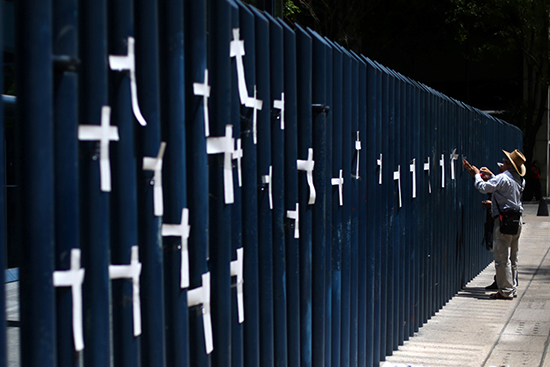Mexico City, April 17, 2017–Mexican authorities should swiftly and credibly investigate the murder of crime reporter Maximino Rodríguez, the Committee to Protect Journalists said today. Unknown assailants shot and killed Rodríguez on April 14 in the northern Mexican city of La Paz, according to his employer.
Rodríguez, 73, reported on crime and the police on Colectivo Pericú, a blog that covers current events in the northern Mexican state of Baja California Sur and that allows readers to denounce crime, corruption, and other grievances. He wrote a regular column for the website Es Mi Opinión (“It’s My Opinion”), in which he commented on crime, politics, corruption, and other topics.
“The murder of yet another Mexican journalist is a grim reminder that Mexico is among the deadliest countries in the world for the press,” Carlos Lauría, CPJ’s senior program coordinator for the Americas, said from New York. “We urge Mexican federal authorities to break the cycle of impunity and violence by bringing the perpetrators of this crime to justice.”
An initial report from Colectivo Pericú said that Rodríguez was attacked at around noon just after he and his wife entered their vehicle in a parking lot. An unknown number of attackers opened fire at the victim at close range from within a white SUV, the website reported, adding that the weapons used were “apparently high-powered,” a term commonly used in Mexico for assault rifles. Rodríguez was killed instantly. His wife was not harmed.
In March 2017 alone, Mexican journalists Miroslava Breach Velducea and Cecilio Pineda Birto were shot to death in direct retaliation for their work. CPJ is investigating the motives behind the March 19 murder of Ricardo Monlui Cabrera. A fourth journalist, Armando Arrieta, survived a March 29 shooting, but was severely injured.
In a statement published on its website yesterday, the Baja California Sur state prosecutor’s office (PGJ) said it had identified one of the weapons in the Rodríguez murder as having been used in an April 5 shooting of a police officer in La Paz. Several attempts by CPJ to reach the PGJ by telephone for further comment were unsuccessful.
According to the same statement, state authorities are collaborating with the federal Special Prosecutor for Attention to Crimes Against Freedom of Expression (FEADLE), which investigates attacks on journalists, by request of Governor Carlos Mendoza Davis. Nahum Pedro Zárate, the deputy general director of the FEADLE, confirmed to CPJ this morning that federal authorities are considering the victim’s work as a journalist as a possible motive.
In his April 11 column, Rodríguez commented on police officers’ operations against a local criminal gang in La Paz. In the article, he was dismissive of the gang and its alleged leader, whom he accused of using violence to spread panic among the city’s population.
The article provoked an angry reaction from a commenter using a pseudonym, in which the commenter threatened to kill Rodríguez and accused the journalist of being on the payroll of a rival gang.
Rodríguez had received other threats in the past, he said in a December 6, 2016, interview with the news website Culco, adding that he was not afraid to continue his work.
Rodríguez was a veteran journalist, and fellow journalists from the area spoke highly of him to CPJ. He had worked as a reporter for a number of national and regional media outlets, including as a correspondent covering the civil wars in Honduras and El Salvador in the 1980s, before completing his career of full-time work as a spokesperson for the Baja California Sur state prosecutor’s office and the state Supreme Court. He began working on the crime beat for Colectivo Pericú in November 2014 after his retirement from full-time work.
“I spoke with him almost every day,” the website’s co-founder, Cuauthémoc Morgan, told CPJ. “Max covered high-impact crimes in La Paz, and because the state is suffering a wave of violence since the summer of 2014, he published his stories very regularly.”
Morgan also said that in November, unknown individuals left a banner with a threat against the website at its office in Los Cabos, south of La Paz. He added that he and others involved with Colectivo Pericú are currently considering requesting safety measures with the federal Protection Mechanism for Journalists.
